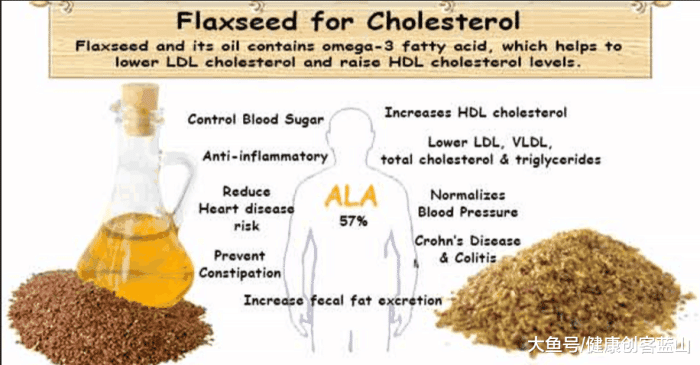食用亚麻籽可以降低胆固醇水平 Flaxseed Consumption Lowers Cholesterol Levels
亚麻籽粉是心脏健康饮食中最有益健康的添加物之一。这种奇妙的小种子在人类5000多年的历史中发挥了重要的作用。亚麻原产于地中海,不仅被用作食物,也被用作纤维,纤维可以织成亚麻布。加拿大农业食品研究中心的一项新研究强调了促进心血管健康的另一个重要作用。
外周动脉疾病(PAD)患者人群试验:亚麻籽在试验开始的第一个月就能减少15%的循环低密度脂蛋白胆固醇
背景资料:
亚麻籽的主要健康益处在于它富含油脂和被称为木质素的纤维成分。亚麻籽油的omega-3脂肪酸含量几乎是鱼油的两倍——尽管它是一种较小的链-亚麻酸,而不是在鱼油中发现的较长的链脂肪,如EPA和DHA。
亚麻籽是木酚素(Lignan) 最丰富的来源。这些成分是纤维化合物,可以与雌激素受体结合,干扰雌激素对乳腺和前列腺组织的促癌作用。木质素还能增加一种被称为性激素结合球蛋白(SHBG)的化合物的产生。这种蛋白质通过帮助体内释放多余的雌激素来调节雌激素水平。亚麻籽粉和精制的木酚膳食补充剂(每天300毫克)也被证明可以降低血液中的低密度脂蛋白胆固醇(LDL)水平。食用亚麻籽可以降低血压。在加拿大温尼伯圣博尼法斯医院研究中心进行的一项双盲研究中,每天食用30克亚麻籽,高血压患者的收缩压平均降低15毫米汞柱,舒张压平均降低7毫米汞柱。
在加拿大的一项双盲研究中,每天食用30克亚麻籽,有显著的降低高血压的作用
新数据:
这项研究的目的是评估膳食亚麻籽对临床意义重大的外周动脉疾病(PAD)患者人群血浆胆固醇的影响,包括许多服用他汀类药物以降低低密度脂蛋白胆固醇水平的患者。患者(110)每天食用含有30克亚麻仁或30克全麦的食物一年。在0、1、6和12个月时测量血浆脂质。
在这些PAD患者的饮食中,亚麻籽在试验开始的第一个月就能减少15%的循环低密度脂蛋白胆固醇(LDL)。然而,在一年的结果中,并没有在所有患者中达到统计学意义。有趣的是,在同时服用亚组亚麻籽和他汀类药物(n = 36)的患者中,12个月后LDL -胆固醇浓度比基线降低了8.5%。这一结果表明,当与他汀类药物一起使用时,亚麻籽的摄取提供了额外的低密度脂蛋白胆固醇(LDL)降低能力。
评论:
这项研究得出的结论是,简单的饮食添加可以产生显著的健康益处。大多数有益的研究都集中在研磨的亚麻籽的使用上,因为这种形式使得有益的化合物比整个种子更容易被释放。在购买亚麻籽粉时,强烈建议购买真空密封包装的亚麻籽粉或自亚麻籽粉被磨碎后已冷藏的亚麻籽粉; 亚麻籽粉容易氧化和变质。
营养不是药,但比药更好
以下是一些快捷的服务建议:
把亚麻籽撒在你的热麦片或冷麦片上。
在早餐奶昔中加入亚麻籽粉。
与酸奶混合。
为了让煮熟的蔬菜更有坚果的味道,可以在上面撒一些亚麻籽。
https://s.click.taobao.com/xJt8MNw
参考:
Edel AL, Rodriguez-Leyva D, Maddaford TG,等。膳食亚麻籽单独降低周围动脉疾病患者的循环胆固醇并降低其水平,其作用超过了单独使用降胆固醇药物。J减轻。2015年4月,145(4):749 - 57。
迈克尔·默里博士
8/18/15
Flaxseed Consumption Lowers Cholesterol Levels
flaxseed
Introduction:
One of the most healthful additions to a heart healthy diet is ground flaxseeds. This wondrous little seed has played an important part of human history for over 5,000 years. Native to the Mediterranean, flax has been used not only as a food, but also for its fibers, which can be woven into linen cloth. Now most valued for its ability to reduce the risk of breast and prostate cancer, a new study from the Canadian Center for Agri-Food Research highlights another important effect in promoting cardiovascular health.
Background Data:
The major health benefit of flaxseeds has focused on their rich content of oil and the fiber components known as lignans. Flaxseed oil contains nearly twice the level of omega-3 fatty acids as fish oils – although it is the smaller-chain alpha-linolenic acid rather than the longer-chain fats like EPA and DHA found in fish oils.
Flaxseeds are the most abundant source of lignans. These components are fiber compounds that can bind to estrogen receptors and interfere with the cancer-promoting effects of estrogen on breast and prostate tissue. Lignans also increase the production of a compound known as sex hormone binding globulin, or SHBG. This protein regulates estrogen levels by helping to escort excess estrogen from the body. Ground flaxseeds as well as purified lignan dietary supplements (300 mg per day) have also been shown to lower blood LDL cholesterol levels. Ground flaxseeds consumption can lower blood pressure. In a double-blind study conducted at the St. Boniface Hospital Research Centre in Winnipeg, Canada, 30 g of ground flaxseed consumed daily produced an average reduction of 15 mm Hg in systolic blood pressure and 7 mm Hg in diastolic blood pressure in hypertensive patients.
New Data:
The purpose of the study was to evaluate the effects of dietary flaxseed on plasma cholesterol in a patient population with clinically significant peripheral artery disease (PAD) including many who were taking statins to lower LDL cholesterol levels. Patients (110) consumed daily foods that contained either 30 g of milled flaxseed or 30 g of whole wheat for one year. Plasma lipids were measured at 0, 1, 6, and 12 months.
Dietary flaxseed in these PAD patients resulted in a 15% reduction in circulating LDL cholesterol as early as 1 month into the trial. Results at one year, however, did not reach statistical significance in all patients. Interestingly, in the subgroup of patients taking flaxseed and statins (n = 36), LDL-cholesterol concentrations were lowered by 8.5% compared with baseline after 12 months. This result indicates that flaxseed consumption provides additional LDL-cholesterol-lowering capabilities when used in conjunction with statins.
Commentary:
The takeaway message from the study is that a simple dietary addition can produce significant health benefits. Most of the beneficial research has focused on the use of ground flaxseeds, as this form allows for the beneficial compounds to be more easily liberated compared to consuming the whole seeds. When buying ground flaxseeds it is highly recommended to purchase ground flaxseeds in a vacuum-sealed package or has been refrigerated since once flaxseeds are ground; they are much more prone to oxidation and spoilage. Here are some quick serving ideas:
Sprinkle ground flaxseeds onto your hot or cold cereal.
Add ground flaxseeds to your breakfast shake.
Mix in with yogurt.
To give cooked vegetables a nuttier flavor, sprinkle some ground flaxseeds on top of them.
Reference:
Edel AL, Rodriguez-Leyva D, Maddaford TG, et al. Dietary flaxseed independently lowers circulating cholesterol and lowers it beyond the effects of cholesterol-lowering medications alone in patients with peripheral artery disease. J Nutr. 2015 Apr;145(4):749-57.
Dr. Michael Murray
8/18/15
Flaxseed Consumption Lowers Cholesterol Levels http://doctormurray.com/flaxseed-consumption-lowers-cholesterol-levels/



.png)
.png)